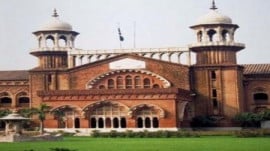
She stepped on stage seemingly nervous, but within seconds documentarian Sharmeen Obaid-Chinoy had the complete attention of her audience.
Speaking for the first time since she was nominated for an Oscar, she shyly admitted that she had not yet grasped what had happened. “I couldn’t believe it when I found out,” she said.
At the International Women Leaders Summit on Wednesday, the journalist and film-maker said what people in Pakistan rarely say; that in some ways, it’s a blessing being a woman in Pakistan. “There are so many liberties that we have on a day-to-day basis in Pakistan. These are luxuries for women in other countries.”
But Pakistan is a country of contradictions, she says. “There are some women who have complete empowerment and others have not been empowered at all.”
Speaking about her experiences in Arab countries, she said she had to get a certificate on morality when filming in Saudi Arabia. “I was the first journalist allowed to document the women’s rights movement in Saudi Arabia.” While filming for her documentary Women of the Holy Kingdom, Obaid-Chinoy spent four weeks in the country and said it was one exasperating process. “I was almost arrested once while filming for ‘attracting male attention’,” she said. “It’s times like these that you thank God that you are from Pakistan.”
After filming in Canada, Syria, Pakistan and East Timor, Obaid-Chinoy says, “Women around the world have the same issues.”
Obaid-Chinoy was nominated for an Oscar in the category for Best Documentary, Short Subject on Tuesday for her film Saving Face. In 2010, she received an Emmy award for her documentary Pakistan: Children of the Taliban.
Published in The Express Tribune, January 26th, 2012.
Correction: An earlier version of the article stated that Obaid-Chinoy was Pakistan's first Oscar nominee. The error has been rectified.
COMMENTS (10)
Comments are moderated and generally will be posted if they are on-topic and not abusive.
For more information, please see our Comments FAQ











































In our Indian subcontinent females are treated worse than slaves. Many look upon them as pieces of enjoyment who must obey at all times. The problem is compounded by our religious thinking which is totally favorable to the males of our species. This documentary is a bold attempt to educate the general public and is therefore laudable.
I don't understand why we're always looking for US & EU & Indian awards to establish our credibility.
Were we sent to this world to satisfy western standards or the Divine standards?
Anybody who got a medal or award for Spiritual work?
Commendable work. Very good indeed
Where can we watch her documentaries?
What will oscar nomination give you? Its time when "women's rights movement" will grip the world so hard that it would be impossible to get free. This is indeed one of the signs of the Last day. Women are already free. Those whom we "think" are not free are actually following their cultureemphasized text with freedom...think how oscar nomination is giving way to advancement towards the end of times...
She really Deserves for such kind of reward.
I am so proud of you , inspired by ur work :)
wondering why only docs like acid attacks, terrorists and children of Taliban are very famous in western world................ She must be happy to portray us as acid thrower.
Its great to see someone from Pakistan brave enough to tackle the problems in society, and in a positive way, and get recognition for it
it is a very positive news for all of pakistanis